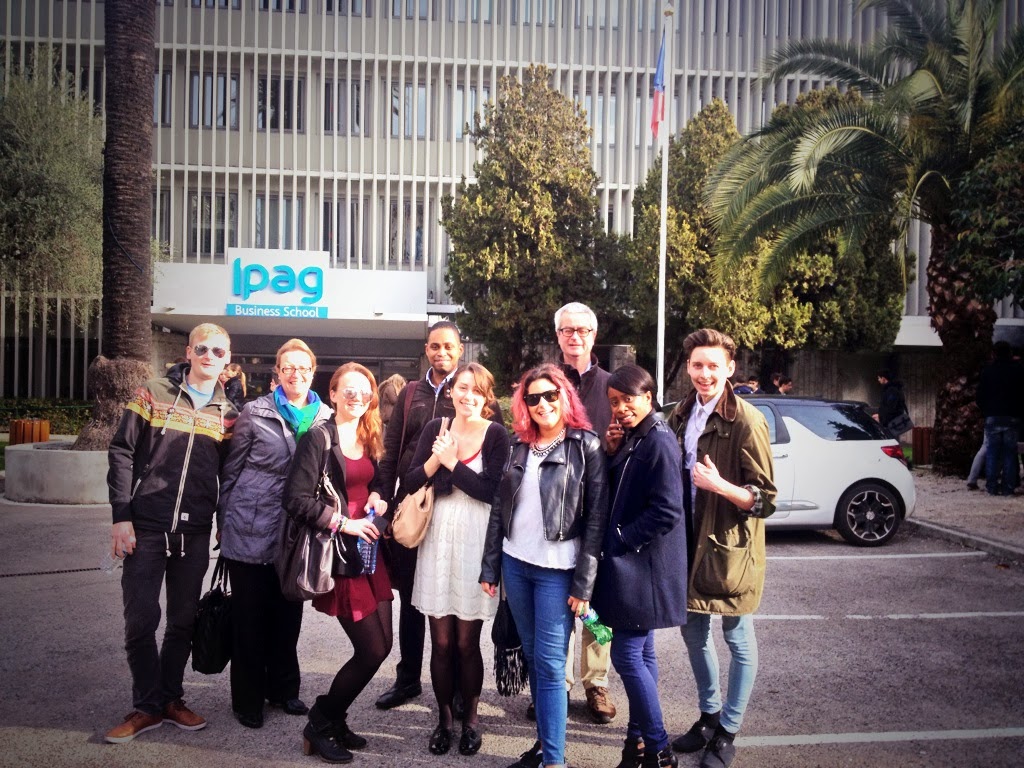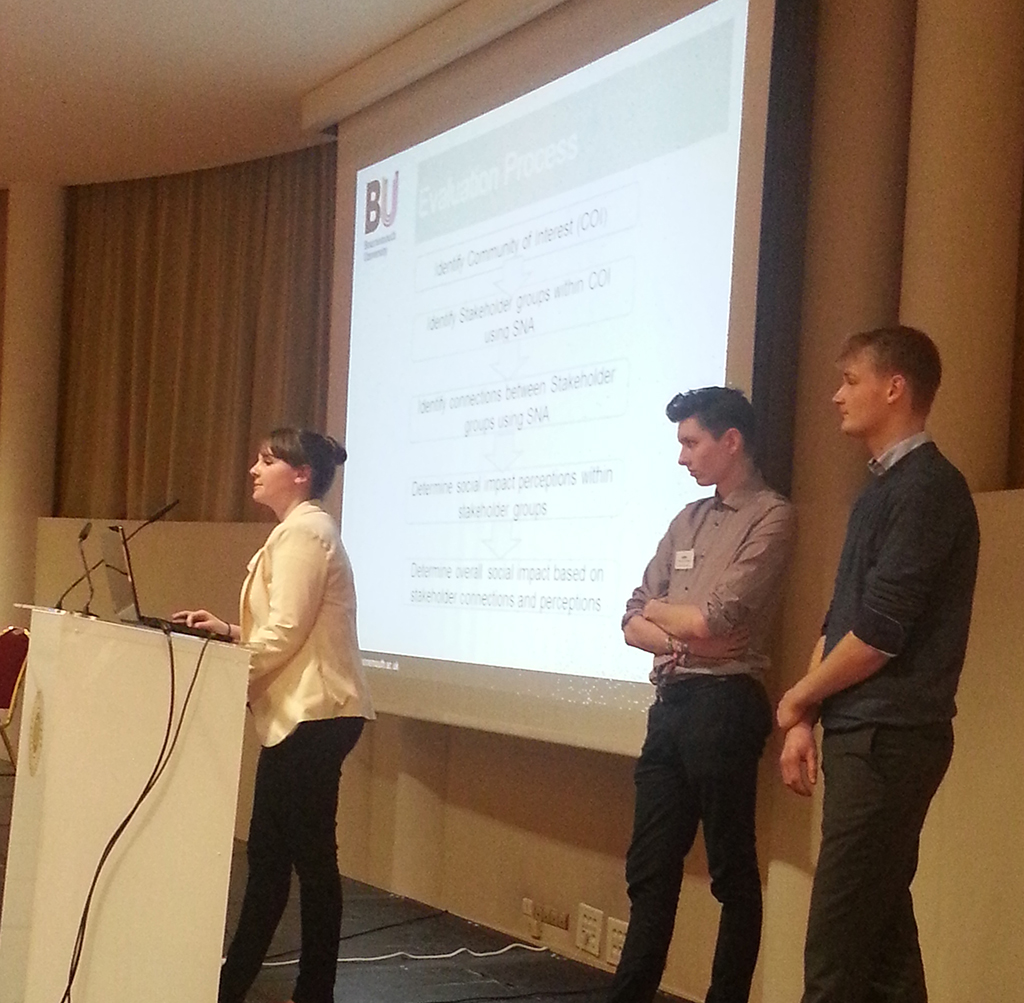Desi Koleva, a hospitality student has become the 1,000th official Bournemouth Ambassador. 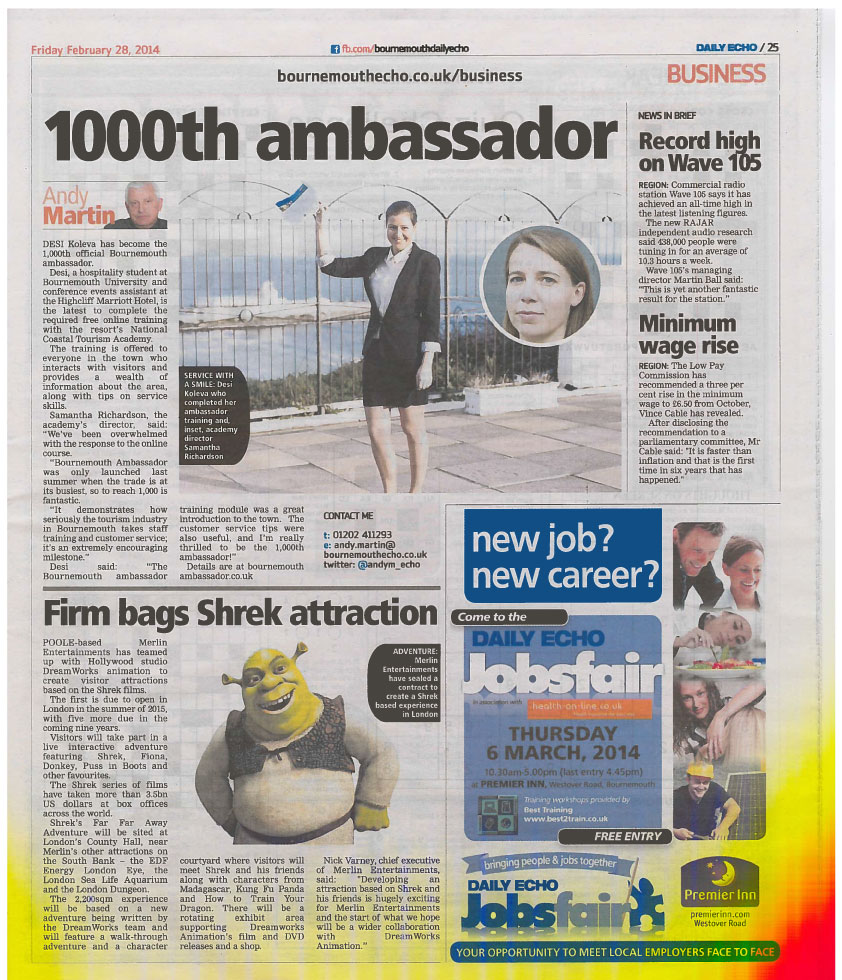
IFEA Europe Conference – Nice 2014
Last week some of the festIM team attended IFEA Europe’s Annual Conference in Nice, the festIM dissertation students had the opportunity to hear inspiring talks from practitioners, academics and network with industry peers and colleagues. Our students were also lucky enough to attended a two day Pre-Conference Masterclass at Ipag Buiness School, Nice where they were able to share and discuss their work with academics and Masters Students studying International Marketing with Tourism & Events.
The festIM team presented their work to an international audience of experienced and well-known industry professionals, including the Deputy Mayor of Nice Rudy Salles and General Manager of Nice Conventions and Events Bureau, Denis Zanon. All of the festIM student’s research received an overwhelmingly positive response from the conference attendees and have already been invited to next year’s event to present the final findings of their work by Colm Croffy, Executive Director of the Association of Irish Festivals an Events (AOIFE) and IFEA Europe Board Member. We would like to thank IFEA Europe and Ipag Business School for arranging such a great conference, the students took a lot away from their time there and are looking forward to attending again in the future.
Murder of Famous Actress at the Glitzy Riviera Hotel
Famous actress, Veronica Myers, is to be murdered on Friday 28th March at the internationally renowned Riviera Hotel where she is to be promoting her latest film, One Short Second.
Transport yourself back to the 1930s, the golden age of Hollywood glamour – when Bette Davis and Greta Garbo were in their prime and film stars were the idol of every young girl and boy. It’s just a matter of time before a threatening note, a dramatic love triangle and strained business relations cause chaos and Veronica is found dead in the dining room. You are invited to attend, witness and solve the crime of the century.

Join organisers, Immersive Events, a group of Bournemouth University students, for a murder mystery evening that you simply won’t forget. A ticket guarantees you a three course meal, welcome cocktail, live band, charity auction and raffle, and live murder mystery solving action.
The event is being held in support of local Dorset charity, Julia’s House – a hospice for Dorset children with life-limiting conditions. It is predicted that in 2014, it will cost £3.9m for the charity to provide the vital care services that they offer.
All profited funds raised will be donated to the charity to provide happiness and joy to the children of the local area.
The event takes place at the Riviera Hotel in Alum Chine, Bournemouth on Friday 28th March 2014 from 7pm until midnight. Fancy dress is thoroughly encouraged in the style of the glamorous 1930s era. Tickets are £40* with discounts for table packages. You can reserve your place online at www.mysteryoftheriviera.com or by calling the Julia’s House Fundraising Team on 01202 644220.
@mysteryriviera
facebook.com/mysteryoftheriviera
To miss out would be simply criminal.
Article from: http://www.thedorsetpost.co.uk/2014/02/murder-famous-actress-glitzy-riviera-hotel/
The Festival Impact Monitor
The Festival Impact Monitor is a Fusion supported project that is intended to develop the following:
1) An approach to evaluating the impact of events using data from social media.
2) Reusable Learning Objects that can guide future researchers seeking to apply social media data.
3) Individuals with experience in conducting research with social media data
Overall, the project intends to develop approaches to evaluating festivals using online narratives of event stakeholders. FestIM can deliver significant benefits for funders of events and event organizers as understanding the characteristics of online audiences can help them create new types of sponsorship products to fund event activity . Further, it enables the evaluation of social impacts, an area that is difficult to assess using conventional qualitative and quantitative approaches. Finally, for events located over a large geographical area, the costs of evaluation can be prohibitive. FestIM can provide a cost effective alternative to traditional evaluation approaches. To achieve the second and third objectives, the project is working with a group of Level H dissertation students. At this stage in their research, these students have completed their literature review and secondary data analysis of online engagement at festivals. FestIM provided the opportunity for these students to deliver their research at the International Festival & Events Association of Europe conference in Nice, France to an audience of academics and industry professionals. The team is shown below along with Dr Phil Long, Associate Dean and IFEA Member and Dr Debbie Sadd and Dr Nigel L. Williams of the project.
The students listed below presented their research to festival organisers from across Europe and the USA and by all accounts delivered a fantastic performance:
Sarah Ardin: community conversations which examines the impact of small rural and urban festivals using social media.
Emma Craig: evaluating the impact of Notting Hill Carnival using social media.
Ryan Kulikowski: the use of Social media as an engagement tool by Festival support organizations
Courtney Lee: the core FestIM process itself and its application to the Love Luton Festival
Doreen Mbagwu: the engagement of the Nigerian and Ghanaian community with Notting Hill Carnival
Rogan Sage: Glastonbury as a platform for engagement with social issues
Jasmine Waddell: post purchase evaluation of Festivals using Glastonbury as a case study.
In addition to presenting their academic research, the students had the opportunity to get an exclusive look behind the scenes of the Nice Carnival which was celebrating its 130th birthday. They participated in workshops with the leading carnival historian Annie Sidro and met the Deputy Mayor of Nice. They then attended the major events of the weekend including a Battle of the Flowers, Main carnival procession and Rock and Roll 10 mile road race. It wasn’t all work as the students were able to take a quick hop down the coast to see Monte Carlo and Monaco. The students will continue to develop their research and will present their completed dissertation findings in our workshop in July at the School of Tourism.
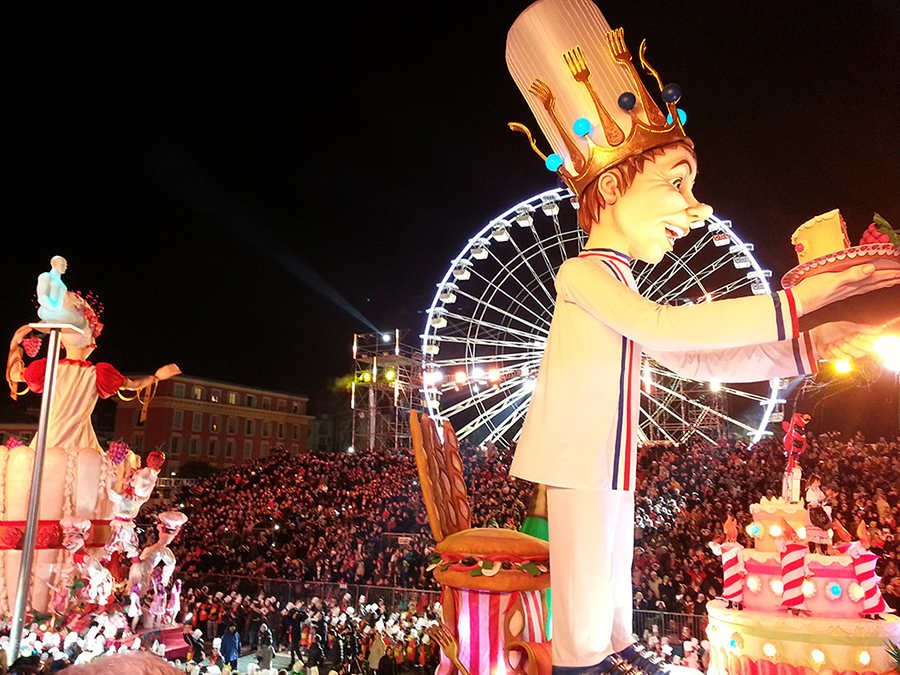
By: Dr Nigel L. Williams and Dr Debbie Sadd
“Life in front of and behind the camera; a Paralympian’s perspective on disability”
Welcome to a talk where Kate Grey will share her experiences of training, studying and competing as a Paralympian for Beijing in 2008 and preparing for London 2012.
Although Kate was not able to qualify for London 2012 due to illness she was able to take an active role on reporting the games for the BBC. As part of this talk Kate will also consider whether or not attitudes towards disability have changed as a result of the increased media focus on the Paralympics and what this might mean for Rio 2016.
To attend please book via these links: BU Students/public and BU Staff
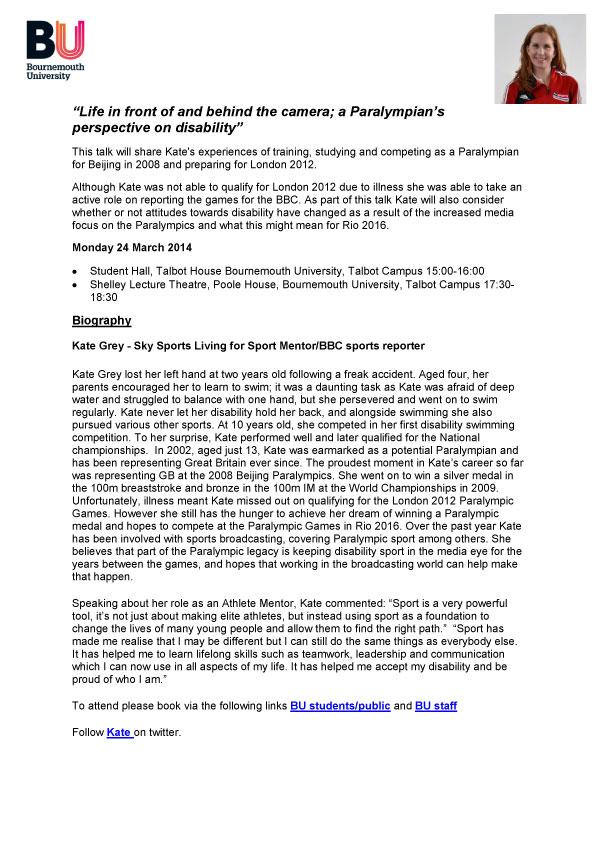
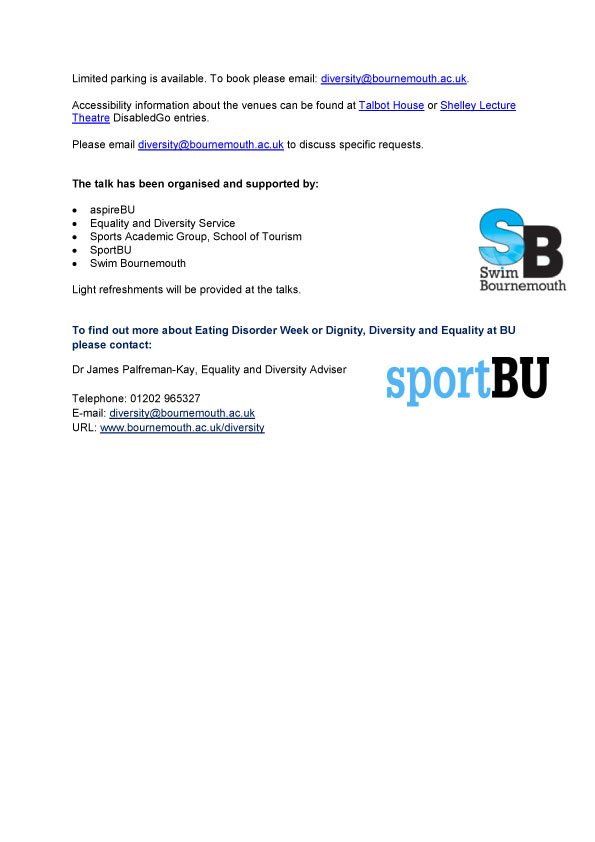
Placement opportunity at Paultons Park
Paultons Park are looking for a Marketing Assistant (Placement) see link below
Dr. Phillip Alford meets with industry to discuss the Google Online marketing challenge
Digital media students at the School of Tourism have been assigned the challenge of using Google Adwords and Google+ to create online marketing campaigns for 11 different businesses, as part of a global project, with over 100 countries participating!
The session gave the businesses a clearer understanding of the challenge and its advantages, as Dr. Philip Alford discussed the basis of the project and encouraged ongoing communication between the clients and student groups during the process. He emphasised the importance of allowing the students’ access to Google Analytics to aid their development, and the significance of keeping a learning journal as a tool for tracking their progress using #BUBlogosphere
The businesses found the session positive and encouraging as we got some feedback of their thoughts. Kirsty Barttelot from ‘Olives Et Al’ was excited for the project as there was lots of information to understand and get to grips with.
Andy King from ‘Intergage’ thought that giving student access to Google Analytics would definitely be beneficial for the businesses to get more out of the challenge.
And finally, Karen Venn (Norburton Hall) described the short 3 week campaign as ‘a blink in the eye of a business’. She was keen to work with the students, having worked on a successful campaign with them last year on the ‘Digital Destination’s Project’. She continued to point out that the session provided a good introduction to show the clients the potential of the campaign, providing lots of fantastic ideas – ‘and not to mention that there is always good food!’
By Divya Satwani
Sport PhD Student Emma Mosley To Be Trained At Top International Research Institute
Congratulations to Emma Mosley, a ST PhD student in Sport, who has been successful in gaining a substantial Santander Mobility Award. Emma will be venturing to Germany for one month in spring to research at the prestigious German Sport University Cologne within the Institute of Psychology.
Emma’s thesis, supervised by Dr Ian Jones and Dr Jo Mayoh, aims to discover the psychophysiological effects of approaching athletic competition stress in a positive manner through the use of heart rate variability (HRV).
In Germany, she will be researching under the supervision of Dr Sylvain Laborde who is an expert in the area of psychophysiology and HRV and works in a large team of internationally renowned sports psychologists.
Whilst at the University Emma will gain experience in HRV data collection, data analysis and the writing of scientific papers in relation to HRV. She will have the opportunity to join on-going research projects as well as conducting her own research.
Dr Tim Breitbarth, the Coordinator for Internationalisation of Sport at BU, said, “The visit offers Emma the chance to start engaging with leading and well-connected experts in her field while receiving first-class training in the most modern equipment at the same time. Also, her visit will help to deepen our established international research, teaching and student exchange partnerships from which BU benefits in terms of reach and reputation.”
For details about her research and international endeavour contact Emma at Emma.Mosley@bournemouth.ac.uk
From: http://blogs.bournemouth.ac.uk/research/2014/02/05/award-allows-sport-phd-student-emma-mosley-to-be-trained-at-top-international-research-institute/?utm_source=digest&utm_medium=email&utm_campaign=daily
Welcome to the Eating Disorder Awareness Week 2014
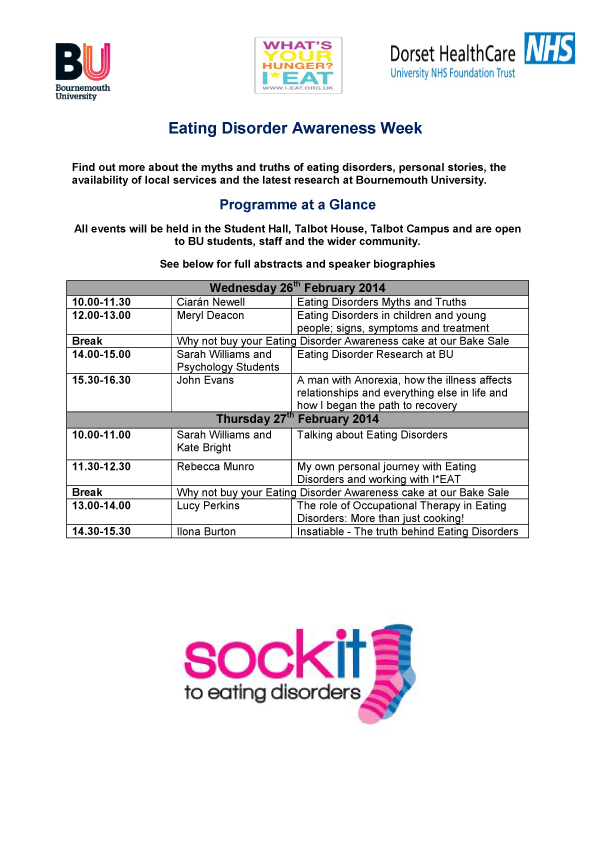 Click below to see the full programme in detail Eating Disorder Awareness Week 2014
Click below to see the full programme in detail Eating Disorder Awareness Week 2014
Applicant Open Days
These days are designed for anyone who’s been made an offer by BU, and would like an opportunity to visit us and learn more about their specific course.
These events are an optional extra to help you make your decision and therefore you are not required to attend. If you’ve previously attended an Open Day you may find some of the content on these events is repeated. However, each event does aim to give you further information about course and the university.
If you haven’t had the chance to visit BU before, then this is a great opportunity to see if the course is right for you before confirming your first and second choices on your application.
Frequently asked questions:
1. How do I hear about Applicant Open Days?
If you are successful in your application and offered a place with us here at BU all the details of possible Applicant Open Days for your course will be listed in your offer letter, including all the details you need to register and attend the day.
2. Can family members/friends join me on an Applicant Open Day?
Yes, of course. We appreciate how important family members and friends’ opinions are in making such a big decision and therefore they’ll be able to join in on all talks and tours throughout the day.
3. I can’t make any of the available dates for the Applicant Open Days, are there any more opportunities to visit BU?
We operate an open-Campus policy at both of our campuses, so you’re more than welcome to come and visit whenever it suits you.
For either Talbot or Lansdowne Campus, you can collect a self-guided tour booklet from one of our reception desks when you arrive, or download them in advance:
- Talbot Campus self-guided tour – booklet (pdf – 884kb)
- Lansdowne Campus self-guided tour – booklet (pdf – 1mb).
For information on travelling to Bournemouth University campuses please see our transport and maps pages.
4. Is there parking available for the Applicant Open Days?
Yes, we have parking available on campus for these events. We’ll send you further information by email once you’ve registered for the event.
5. Do I need to attend an Applicant Open Day if I’ve already been on an Open Day?
No, this is purely an optional event for you. The event is ideal if you want to ask any more questions about your course, refresh your memory, or if you didn’t get the chance to visit Bournemouth during the main Open Days, in October and November.
We do repeat some content delivered at the main Open Days. Some events offer new sessions, such as practical workshops.
6. Do we get to see accommodation on an Applicant Open Day?
If you are attending an Applicant Open Day on Talbot Campus then we’ll be able to show you our Student Village. However there won’t be any viewings of our accommodation on our Lansdowne Campus.
You can find out more about all of our Halls of Residence and Unilet (BU managed) accommodation on our webpages.
7. Do I need to wear smart clothes when attending an Applicant Open Day?
As part of the day involves a Campus tour, it is important to wear sensible footwear and clothing for an outdoor tour. Smart wear is not essential.
From: http://microsites.bournemouth.ac.uk/undergraduate/2014/01/09/applicant-open-days/


